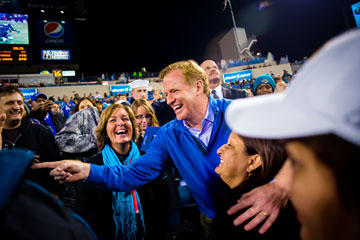
Goodell mingles with fans in Jacksonville, Fla. The Senator's son has a politician's touch
(4 of 9)
Goodell insists his motives for the safety measures are pure. "I don't do things for public relations," he says. "I do things because they're the right thing to do, because I love the game." And if that means he's not beloved? "If you want to do the popular thing, be a cheerleader."
The commissioner has leeway for unpopular moves because the league is more lucrative than ever. Even his staunchest foes acknowledge his executive chops. "His stewardship of the business of football and the game," says DeMaurice Smith, head of the NFL Players Association, which has sparred with Goodell over the Bountygate incident, "has been extraordinary." In 2006, the year Goodell took over from Paul Tagliabue, the average broadcast viewership of NFL games was 66% higher than the network prime-time average; now it's 151% higher. Having negotiated labor peace with its players (whose average salary is now $2.1 million) until 2020, the NFL signed TV deals with CBS, Fox and NBC that will last until 2022. The networks will pay the NFL some $3 billion a year, a 60% increase over the previous deal.
Growing Up Goodell
From his earliest days, Goodell was obsessed with football. He still remembers getting his first official NFL football--"the Duke"--from a family friend when he was 6 years old. "Just that smell, the whole thing, I will never forget it," he says, watching the Jets and the Dolphins from a private box in MetLife Stadium. He even slept with it for a few months, something his brothers--he is the middle of five boys born within a seven-year span--took pleasure in teasing him about.
Goodell started playing tackle football in fourth grade and was an aggressive kid, fond of fighting. He put those traits to use defending his younger brother Michael, who was his opposite and a target of bullies. "Absolutely, he would beat the crap out of people," says Michael. "Roger was not Atticus Finch." (Michael came out after college and has been with TV writer Jack Kenny, now his husband, for 30 years.) When they were older, Michael once visited Roger in college and went to the bar where he worked. "There were these two twins, they were body-builder twins, they were freaks," says Michael. The meatheads picked Michael up and were about to punch him, until Roger started cursing them from behind the bar. They put Michael down. "So yeah, it was a lifelong thing," says Michael of the intervention.
When Michael sees gay kids committing suicide because of bullying, he reflects on how he could have been one of them. "I was the type who would have been beat up a lot," Michael says. "It would have been humiliating. What would that have meant if I did survive it? Would I have done drugs? There are all sorts of things you can turn to just because of self-hatred and loathing. But none of that was even a possibility, because I had this support around me. So, yeah, Roger is very much a hero figure for me." When I relay Michael's words to big brother Roger, he tears up. "Ha," he says, sniffling, unable to say much else. "That's the first time I heard that. I didn't know it had that much impact on him."
